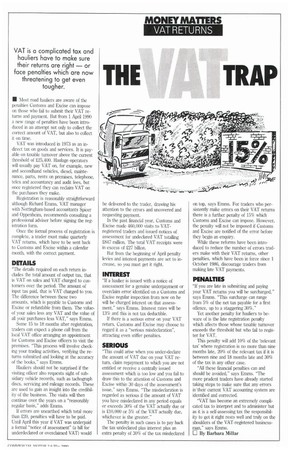THE
Page 59

If you've noticed an error in this article please click here to report it so we can fix it.
VAT is a complicated tax and hauliers have to make sure their returns are right — or face penalties which are now threatening to get even tougher.
• Most road hauliers are aware of the penalties Customs and Excise can impose on those who fail to submit their VAT returns and payment. But from 1 April 1990 a new range of penalties have been introduced in an attempt not only to collect the correct amount of VAT, but also to collect it on time.
vAT was introduced in 1973 as an indirect tax on goods and services. It is payable on taxable turnover above the current threshold of 225,400. Haulage operators will usually pay vAT on, for example, new and secondhand vehicles, diesel, maintenance, parts, rents on premises, telephone, telex and accountancy and audit fees, but once registered they can reclaim VAT on the purchases they make.
Registration is reasonably straightforward although Richard Emms, VAT manager with Nottingham-based accountants Spicer and Oppenheim, recommends consulting a professional adviser before signing the registration form.
Once the formal process of registration is complete, a trader must make quarterly VAT returns, which have to be sent back to Customs and Excise within a calendar month, with the correct payment.
DETAILS
"The details required on each return includes the total amount of output tax, that is VAT on sales and VAT charged to customers over the period. The amount of input tax paid, that is VAT charged to you. The difference between these two amounts, which is payable to Customs and Excise or refundable from them. The value, of your sales less any VAT and the value of all your purchases less VAT," says Emms.
Some 15 to 18 months after registration, traders can expect a phone call from the local VAT office arranging an appointment for Customs and Excise officers to visit the premises. "This process will involve checking your trading activities, verifying the returns submitted and looking at the accuracy of the books," says Emms.
Hauliers should not be surprised if the visiting officer also requests sight of subsidiary vehicle records, such as tachograph discs, servicing and mileage records. These are used to gain an insight into the credibility of the business. The visits will then continue over the years on a "reasonably regular basis," adds Emms.
If errors are unearthed which total more than 220, penalties will have to be paid. Until April this year if VAT was underpaid a formal "notice of assessment" (a bill for underdeclared or overclairned VAT) would be delivered to the trader, drawing his attention to the errors and uncovered and requesting payment.
In the past financial year, Customs and Excise made 460,000 visits to VATregistered traders and issued notices of assessment for undeclared VAT totalling 2847 million. The total VAT receipts were in excess of 227 billion.
But from the beginning of April penalty levies and interest payments are set to increase, so you must get it right.
INTEREST
"If a haulier is issued with a notice of assessment for a genuine underpayment or overclaim error identified on a Customs and Excise regular inspection from now on he will be charged interest on that assessment," says Emms. Interest rates will be 13r", and this is not tax deductible.
If there is a serious error on your VAT return, Customs and Excise may choose to regard it as a "serious misdeclaration", attracting even stiffer penalties.
SERIOUS
"This could arise when you under-declare the amount of VAT due on your VAT return, claim repayment to which you are not entitled or receive a centrally issued assessment which is too low and you fail to draw this to the attention of Customs and Excise within 30 days of the assessment's issue," says Emms. "The misdeclaration is regarded as serious if the amount of VAT you have misdeclared in any period equals or exceeds 30% of the VAT actually due or is 210,000 or 5% of the VAT actually due, whichever is the greater."
The penalty in such cases is to pay back the tax undeclared plus interest plus an extra penalty of 30% of the tax misdeclared on top, says Emms. For traders who persistently make errors on their VAT returns there is a further penalty of 15% which Customs and Excise can impose. However, the penalty will not be imposed if Customs and Excise are notified of the error before they begin an enquiry.
While these reforms have been introduced to reduce the number of errors traders make with their VAT returns, other penalties, which have been in force since 1 October 1986, discourage traders from making late VAT payments.
PENALTIES
"If you are late in submitting and paying your VAT returns you will be surcharged," says Ennis. "This surcharge can range from 5% of the net tax payable for a first offence, up to a staggering 30%."
Yet another penalty for hauliers to beware of is the late registration penalty which affects those whose taxable turnover exceeds the threshold but who fail to register for VAT.
This penalty will add 10% of the 'relevant tax' where registration is no more than nine months late, 20% of the relevant tax if it is between nine and 18 months late and 30% of the tax in any other case.
"All these financial penalties can and should be avoided," says Emms. "The more prudent traders have already started taking steps to make sure that any errors in'their current VAT accounting system are identified and corrected.
"VAT has become an extremely complicated tax to interpret and to administer but as it is a self-assessing tax the responsibility to get it right rests well and truly on the shoulders of the VAT-registered businessman," says Emms.
II By Barbara Millar








































































































































































